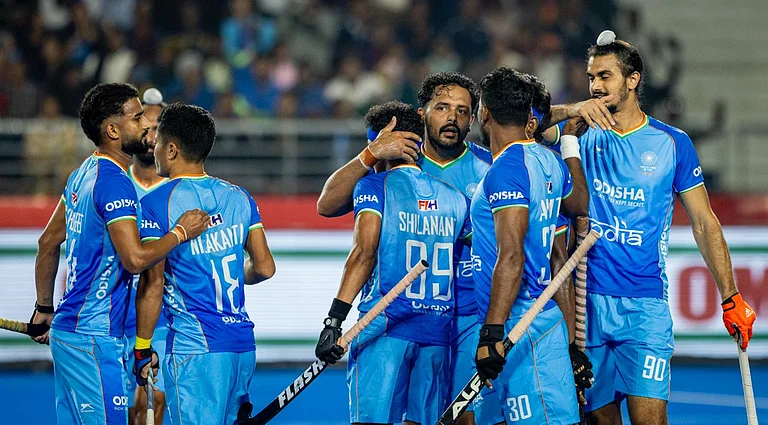Once, giants bestrode Kerala’s hallowed football grounds—names the whole country spoke of with awe. Then, a period of steep decline—it was as if the romance had fizzled out in a state in love with the beautiful game. Now, a deep slumber is broken by the huzzahs of fans that bounce off the sparkle of fresh silverware. Twenty years after Kerala Police won their second straight Federation Cup in 1991, Gokulam Kerala FC have gladdened the hearts of passionate Malayali football fans by becoming the first team from the state to win the I-League championship, the premier club tournament that mirrors Indian talent.
Consider this: If there was a vote for Kerala’s most popular sportsperson today, Emil Benny would probably beat IPL star Sanju Samson. The 20-year-old striker from Wayanad played a big role in Gokulam’s I-League triumph and is a rising star. The pony-tailed youngster added the insurance goal as Gokulam staged a remarkable comeback against Manipur’s TRAU FC to finish 4-1 winners in a dramatic league final in Calcutta recently.
Cricket got a toehold in Malayalis’ sporting palate—exploits of locals like Sreesanth or Samson certainly helped—purely because football had taken a backseat ever since the likes of I.M. Vijayan and Jo Paul Ancheri gave up serious football around 2005. Kerala Football Association secretary Anil Kumar admits Kerala had lost ground in the last two decades. “Lack of long-term planning and paucity of professionalism hurt Kerala football. Also, we couldn’t create a league which gave opportunities to Kerala players,” says Kumar.
Effectively, Kerala stopped supplying quality players to the national teams. A handful, like Kannur-born C.K. Vineeth, Malappuram’s Anas Edathodika, Thrissur’s Rino Anto and Rahul KP and Thiruvananthapuram’s Jobby Justin made impressive starts with their I-League teams but lost out in the ISL rat race, where a team like Kerala Blasters have given priority to mediocre foreigners over local talent.
However, a conscious effort at restructuring seems to be working. The first step the KFA took in 2014 was to have a pool of qualified coaches, deployed in villages to start grassroots level training centres. At present, there are over 300 such centres. District-level competition in various age categories, starting from under-12, have rekindled interest too. In 2018, Kerala won the Santosh Trophy, a sure sign that Kerala was on a counterattack. The Kerala Premier League has also done its good deed. The prize money tournament that started in 2013-14 features 12 semi-professional teams like Gokulam, Kerala Police, Kerala State Electricity Board, Kovalam FC etc. Despite COVID regulations, every match draws around 5,000 fans; thousands more watch online.
Gokulam Kerala FC’s I-League win, therefore, rides the crest of a football wave. Gokulam, the owner, is a four-decade-old business group with interests in chit funds and finances; crucially, it has not mixed business with football. To its creditable success at home, add the fact that they were semifinalists in the 2019 Sheikh Kamal International Club Cup in Bangladesh. “We don’t see football as an opportunity to grow our business,” says club president V.C. Praveen, who, says Kerala’s football fraternity, laid the blueprint for GKFC’s success.
With I-League teams unlikely to qualify for the ISL on merit until 2023-24 and in the absence of quality national tournaments, teams like Gokulam, TRAU, Aizawl FC, Chennai City, Real Kashmir, Punjab Sports Club and Churchill Brothers will have to grind it out in a league that unfairly gets shabby treatment from the All India Football Federation. Till I-League teams get an opportunity to play in ISL, teams like Gokulam and TRAU will live in the fear of a talent drain to richer ISL teams. Former footballer Sharaf Ali, part of the famous Malayali troika with C.V. Pappachan and V.P. Sathyan, says Gokulam’s biggest challenge will be to retain its talented core. “ISL teams can easily lure the better players away,” he says.
For now, as I-League champions, the Kozhikode-based GKFC will play their first big continental tournament—the AFC Cup—in 2022. That’s reason enough for the likes of Benny, Muhammed Rashid, Mohammed Salah and Shibil Muhammed to remain loyal for at least two more seasons. For anything to rebuild, commitment and loyalty are non-negotiable. But Gokulam’s Italian coach Vincenzo Alberto Annese is already on a scouting mission—reaping talent, then fashioning them into the next generation of stars who would light up Kerala football.


























